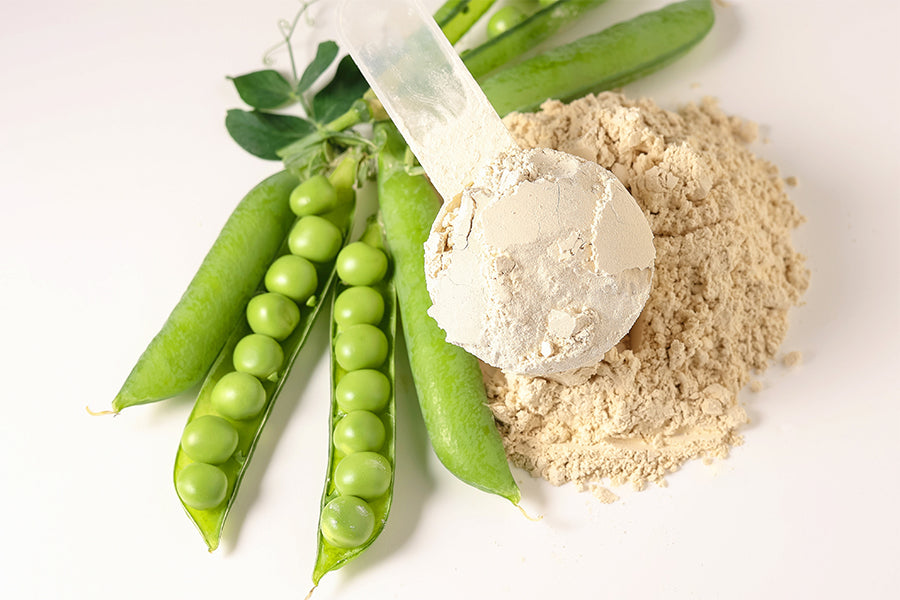The protein showdown of our generation—the age-old conundrum has everyone talking: about plant-based vs. whey proteins. If you've been on social media in the last few years, then there's no doubt you’ve heard about these two forms of protein being pitted against each other. But which one should you opt for?
This blog post will look at both types of proteins and see how the two different supplements stack up. It's time to determine which popular protein options will win this match-up.
Related Article: 5 Things You Should Keep in Mind When Taking Whey Protein
What is Whey Protein Powder?
Whey protein powder is a popular supplement among athletes and bodybuilders, but how exactly is it made? It comes from cow milk. It all begins with the by-product of cheese making, better known as whey.
This milky liquid is collected and processed by removing carbohydrates, fat, water, and other components. What's left is then spray-dried into the familiar powder we find on the shelves at our favorite health food store.
It is further divided into multiple supplements like whey protein isolate (WPI), whey protein concentrate (WPC), and whey protein hydrolysate (WPH).
Now that you know where all that protein comes from, take note. Because whey protein isolate contains less lactose than its counterpart (whey protein concentrate), ask your doctor if it would work for your lifestyle.
Related Article: A Beginners Guide on Whey Protein and How It Can Help You
What is Plant-Based Protein Powder?
Plant-based protein powders are a great way to add a much-needed boost of nutrition to your diet. Not only are they derived from various plants, such as brown rice, pea, soy, and hemp – depending on the brand you choose, but they can also be a combination.
And if you’re dairy-free or lactose intolerant - thanks to their plant-based ingredients, you don’t have to worry about anything that comes from cows making its way into your smoothie. So if you’re looking to get that much-needed macro and micronutrients in one easy shake, go ahead and scoop up some of those lovely plant-based protein powders.
Following are the differences between whey proteins and plant-based proteins.
- Whey proteins are derived from cows, whereas plant-based proteins do not contain animal products but are entirely derived from plants. This makes them reliable for vegans.
- Whey proteins are always complete, but some plant proteins may not be complete, which depends on their mix of vegetable-based proteins. Moreover, each plant-based supplement's amino acid display may differ depending on the blend used though whey proteins will always be consistent.
- The amount of proteins remains roughly the same in whey proteins; however, the number of proteins in plant-based powders can differ depending on the type of plant protein utilized.
- Whey proteins are mild in taste, while plant protein powders can taste bitter, nutty, and earthy.
- Plant proteins require less land, water, and energy to produce as compared to animal proteins.
Similarities Between Whey & Plant-Based Proteins
Here are the similarities between whey and plant-based proteins.
- Whey protein and plant-based protein powders provide protein. According to research, these proteins help refuel and repair muscle after a workout.
- Both types can be utilized in protein shakes, snacks, or meals.
- Plenty of flavors are available for both whey protein and plant protein powders.
Pros & Cons of Whey Vs. Plant Protein
When it comes to protein, whey, and plant-based sources have become increasingly popular as time goes on. Both have advantages and disadvantages, and if you’re trying to determine which your body prefers, this is a difficult choice.
Pros of Whey Protein
- Whey is an animal-based protein source, containing all of the essential amino acids your body needs to grow and repair muscle fibers. It contains BCAAs and leucine that helps in forming lean body mass.
- Whey proteins are also absorbed quickly by the body, making them a great post-workout protein that athletes and bodybuilders can adopt due to their active routines.
- Whey promotes weight loss; according to research, whey proteins help lose fat. They also help boost metabolism and reduce appetite.
- Whey proteins contain vitamins A and C with other essential nutrients that boost immunity in the body.
- These proteins help improve sleep quality and reduce stress because they contain bioactive milk peptides.
- Whey proteins reduce the amount of C-reactive powder that causes inflammation in the body. Therefore, after a workout, it reduces the risk of inflammation of the muscles.
Cons of Whey Proteins
- These products are made from animal products so if you are vegetarian or vegan you cannot consume whey protein.
- Consuming whey protein can sometimes cause bloating, headache, nausea, and thirst after consuming, mostly for the ones that are lactose intolerant or have a sensitivity.
Pros of Plant-Based Proteins
- Plant-based proteins provide numerous health benefits, including potential cancer prevention and being great sources of fiber and antioxidants.
- They reduce the risk of chronic diseases like obesity, heart disease, stroke, high cholesterol, and many cancers.
- Plant-based proteins can be a great way to build muscle. These provide the amino acids and important vitamins and minerals the body requires to assist in building healthy muscles.
- They help promote a healthy gut due to the fiber content, so the more you eat plant-based proteins, the healthier your gut will be.
- The plant-based proteins give a younger and healthier look to the users. The antioxidants help fight the free radicals, giving young, healthy, glowing skin.
- They are suitable for better athletic performance because plant proteins improve athletes' energy levels and recovery time.
Cons of Plant-based Proteins
- Plant-based proteins are not complete proteins, so you have to ensure you're getting all of your nutritional requirements in one meal, whereas, with whey, you just have one source for all nine essential amino acids.
- The body does not readily absorb plant proteins due to the absence of nine essential amino acids and the important minerals it hinders. To improve absorption, you may need to supplement with other amino acids and minerals.
- The plant proteins lack vitamin B12 since it is sourced from meats. The deficiency can further cause problems like anemia, paralysis, neurological disorders, etc. to fulfill the deficiency, you will have to take supplements for vitamin B12 with your doctor’s guidance.
Depending on your lifestyle and dietary choices, each will be better for specific individuals leading to much debate in the fitness industry.
Related Article: Top 7 Benefits of Whey Protein Powder
What Makes A "Quality" Protein Source?
Quality protein sources should contain a good balance of essential amino acids for muscle growth and repair. Great sources are lean meats, poultry and fish, tofu, eggs, nuts, and seeds. If vegan or vegetarian, legumes such as beans and lentils and other non-animal-based sources, make great substitutes.
For optimal quality when choosing animal proteins, consider organic or grass-fed options that ensure fewer hormones and antibiotics have been used in the production process. All these protein sources come with added health benefits and the satisfaction that you’re getting one of the best foods to optimize your overall health.
If you want the top-of-the-line in protein sources, look no further than animal proteins - eggs, milk, meat, fish, and poultry. These sources provide 'complete proteins,' making them best in class among food sources.
Related Article: Why Does the Human Body Need Protein, and Where Should It Come From?
Which Should I Choose?
When choosing between whey and plant-based proteins, I'm usually left scratching my head. Could it be that I need to start taking both? Well, let's think about this.
On the one hand, you have the proteins found in dairy products like Milk, Cheese, and yogurt - that's whey protein. It packs a punch with all its essential amino acids, but on the other hand, plant-based proteins make for an easy-to-digest option if you're lactose intolerant.
Ultimately it depends on your goals. If you're looking for muscle-building power, go with whey protein. But if you want to achieve long-term health goals without having to stomach dairy, the answer is pretty clear - plant-based is probably your best bet.
FAQs
1. is plant-based protein powder good for building muscle?
These provide the amino acids needed to promote healthy muscle growth. Additionally, many products contain additional ingredients like creatine, BCAAs, and other vitamins and minerals that can help support greater muscle gains when combined with regular exercise and a balanced diet.
2. is plant protein powder a good choice for health?
Plant protein powder is a good choice for anyone looking to add more nutrition to their diet. It's completely natural, easy to digest, and packed with various nutrients that can help boost energy levels and improve overall health. Plant-based protein is better for the planet than animal-based proteins and has a superior amino acid profile that is essential for muscle growth.
3. What are the disadvantages of plant-based protein powder?
Plant proteins lack some essential amino acids required to build muscle, so they’re not as effective as a complete source of protein. Additionally, some plant-based protein powders may contain additives such as artificial sweeteners and thickeners that can pose health risks.
Plant-based powders often miss the important vitamins, minerals, and fatty acids found in whole foods sources like legumes and quinoa that make them such powerful fuels for our bodies.
4. is plant protein the same as whey protein?
Plant protein and whey protein are often compared, but it is important to note that they differ in several significant ways. Plant protein sources such as nuts, grains, and legumes may not provide the same nutrients as whey.
The latter is derived from milk and contains all nine essential amino acids needed for building muscle, unlike plant proteins which tend to be limited in certain amino acids.
The Bottom Line
To choose between the two, it is important to know what suits you best. Whey proteins are milky liquids collected and processed by eliminating carbs, fat, water, and other components. They are found in powders, whereas plant-based proteins are powders produced from different types of plants like brown rice, pea, soy, and hemp and do not contain lactose or dairy factor in them.
Both proteins have a handful of pros and cons that shape the body, like weight loss, muscle building, anti-aging aspects, and prevention of infections and diseases that are similar in both proteins. Some great sources of animal proteins are eggs, meat, milk, fish, and poultry, and for plant-based proteins are legumes and lentils. These proteins are great for refueling the body, building muscles, and great for health.
Reading List
Article Sources
- Teixeira, Filipe J., et al. ‘A Novel Plant-Based Protein Has Similar Effects Compared to Whey Protein on Body Composition, Strength, Power, and Aerobic Performance in Professional and Semi-Professional Futsal Players’. Frontiers in Nutrition, vol. 9, July 2022, p. 934438. PubMed Central, https://doi.org/10.3389/fnut.2022.934438.
- Hertzler, Steven R., et al. ‘Plant Proteins: Assessing Their Nutritional Quality and Effects on Health and Physical Function’. Nutrients, vol. 12, no. 12, Nov. 2020, p. 3704. PubMed Central, https://doi.org/10.3390/nu12123704.
- Hoffman, Jay R., and Michael J. Falvo. ‘Protein – Which is Best?’ Journal of Sports Science & Medicine, vol. 3, no. 3, Sept. 2004, pp. 118–30. PubMed Central, https://www.ncbi.nlm.nih.gov/pmc/articles/PMC3905294/.
- Westerterp-Plantenga, M. S., et al. ‘Dietary Protein, Weight Loss, and Weight Maintenance’. Annual Review of Nutrition, vol. 29, 2009, pp. 21–41. PubMed, https://doi.org/10.1146/annurev-nutr-080508-141056.











